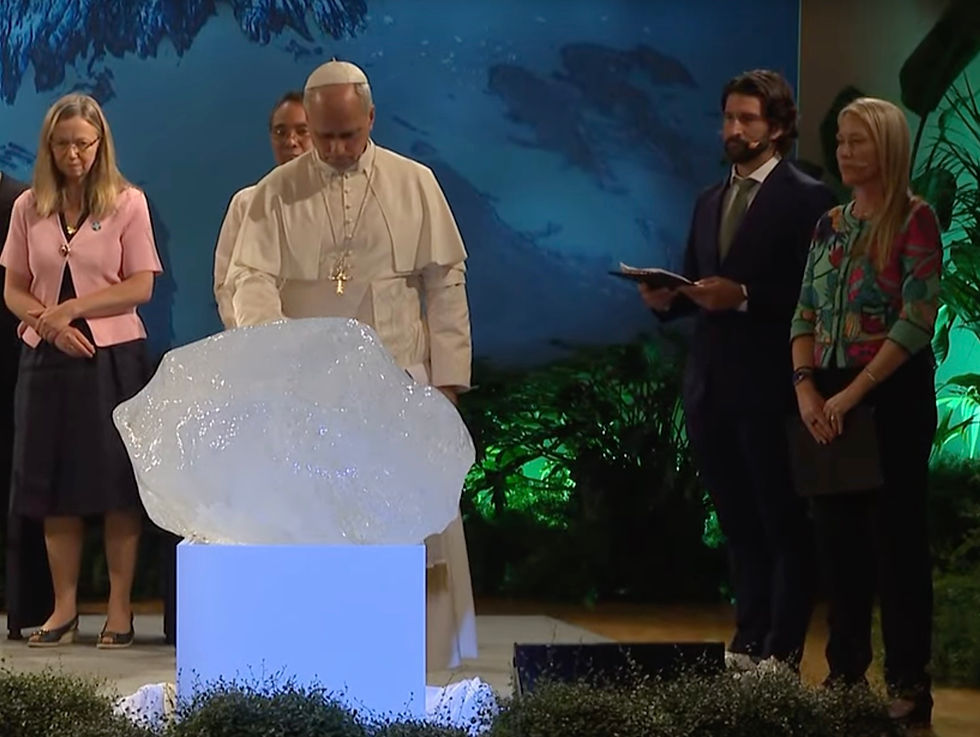We Are Called to Cultivate and Care for the Earth and Its People
- Tom Faletti

- Oct 2, 2025
- 6 min read
Evangelical and Catholic Christians all over the world, except for some in the United States, know that climate change is real and are working to reverse the damage to our planet and address the ways it disrupts and devastates so many lives. At a conference, Pope Leo said: God will ask us if we cultivated and cared for the world and took care of our brothers and sisters. In the Bible, God commands us to do both. Do we?

Far too many American Christians believe in a falsehood that they would know is not true if they would just consult their fellow Christians in other countries. The falsehood is that climate change is not real. It travels with another lie: that people are not suffering due to climate change.
Christians all over the world understand the reality of climate change and its devastating effects. They have experienced it personally and they understand the science that has documented it so thoroughly. But many Christians in the United States have insulated themselves from this truth that is so obvious to their brothers and sisters elsewhere.
Evangelical leaders know climate change is real and is hurting people
I have asked leaders of evangelical aid organizations how climate changing is affecting the people they serve. They don’t respond by saying, “What are you talking about? Climate change is a hoax.” No, they don’t respond that way, because that would be a lie.
They respond by telling me about the devastating effects of climate change that they see in the communities they serve: how it makes everything they are trying to do harder; how Christians and non-Christians alike are suffering; how climate change is already killing people and world leaders and their citizens are failing to act to address the problem.
Catholic leaders know that urgent action is needed to address the harms that humans are inflicting on our common home
I don’t have to ask Catholic leaders how climate change is affecting their people. From the pope to bishops to aid and development leaders, the message is clear: Climate change is real; it is disrupting millions of lives; and it needs to be addressed urgently now.
Catholic aid and development organizations are very forthright about how the carbon pollution that causes climate change is undermining their work, upending people’s lives, and tipping fragile communities into widespread destruction.
The climate crisis challenges us to make a spiritual change, a change of heart
Yesterday, October 1, 2025, Pope Leo XIV convened a conference acknowledging the 10th anniversary of Pope Francis’s encyclical Laudato Si'. (An encyclical is a “circular letter” or pastoral letter from the pope to the Church about a particular issue; and many encyclicals in recent years have been addressed also to all people of good will.) Laudato Si' highlighted the urgent need to care for the Earth as our common home and to take action to respond to the climate crisis and the cries of the poor who are disproportionately affected by it.
The ”Raising Hope for Climate Justice” conference seeks to foster greater action to address climate change and the needs of our common home. Its leaders have described it as an effort to bring together “religious, scientific, and political leaders to reflect on the impact of Laudato Si' and to give life to a global spiritual response to the climate and ecological crisis.”
A “spiritual” response? In what way is climate change a spiritual question?
It requires a spiritual response because it is a question of truth.
When Christians, or anyone else, are led to believe falsehoods, that has spiritual consequences. Jesus said, “I am the truth” (John 14:6). When we believe a lie, our connection to Jesus is diminished.
It requires a spiritual response because it shows whether we understand Jesus’s command to love our neighbors.
If we fail to respond to the urge needs of people around the world who are suffering because of our climate pollution, if we fail to hear the cry of the poor who appear before us as the man the Good Samaritan encountered on the road to Jericho (Luke 10:25-37), we are failing to respond to Jesus’s call to “love your neighbor as yourself” (Luke 10:26-28).
It requires a spiritual response because it shows whether we understand God’s first command: to cultivate and care for the land.
In the story of the Garden of Eden, when God first created humans, he charged them with a very specific task: to “cultivate and care for” the Garden (Gen. 2:15, NABRE). That command did not stop at the Garden gates. Wherever we go, the command goes with us: to cultivate and care for whatever land God has allowed us to have.
The false theology of “dominion”
Some Christians have ignored the command in Genesis 2:15 and instead have become fixated on a false reading of a statement in Genesis. In Genesis 1:26 and 1:28, God gives humans “dominion” over the animals and birds. Some Christians have used that term as an excuse to ignore the impact we have on the environment. Here is what they are missing:
The dominion we have received does not nullify God’s command to cultivate and care for the Earth.
A grant of dominion is not permission to harm the land. When a king or queen is given “dominion” over a nation, they are expected to do what is best for the people of that land, not to do what enriches themselves through the impoverishment and despoiling of those around them. The grant of dominion is an awesome duty to care for all of creation and help it thrive, not a license for selfishness.
Right smack in the middle of the grant of dominion stands Genesis 1:27, where God creates humans in his image. God has dominion over us. He uses that dominion to love and care for us and to do what nourishes and benefits all of us. He made us in his image so that we could reflect his image by doing the same. We are called to exercise our delegated dominion to love and care for the world and do what nourishes and benefits all of its people. A dominion of indifference or domination is not dominion at all; it is a tyranny that does not reflect the image of God.
Pope Leo asks a very simple question
In his keynote address at the conference, Pope Leo said,
“These challenges are of a social and political nature, but first and foremost of a spiritual nature: they call for conversion.... We cannot love God, whom we cannot see, while despising his creatures. Nor can we call ourselves disciples of Jesus Christ without participating in his outlook on creation and his care for all that is fragile and wounded.”
And that leads us to Pope Leo’s question:
“I would like to conclude with a question that concerns each of us. God will ask us if we have cultivated and cared for the world that he created (cf. Gen 2:15), for the benefit of all and for future generations, and if we have taken care of our brothers and sisters (cf. Gen 4:9; Jn 13:34). What will be our answer?”
Think about that for a minute:
When you come before God at the end of your life, and he asks you, “Did you cultivate and care for the land I gave you for the benefit of all?” – how will you answer?
And when he asks, “Did you care for your brothers and sisters who were struggling under the burden of climate change?” – how will you answer?
I want to be able to say that I took action to share God’s love with others by helping to alleviate the harm caused by climate change.
Let us act boldly to address the climate crisis because we actually love our Earth and our neighbors – or if that’s not a good enough reason, then at least because we care about how God will react.
_____
P.S. Don’t forget to try out the Faith, Hope, and Love quiz. See how much you know about these core virtues that contribute to the good life.












Comments